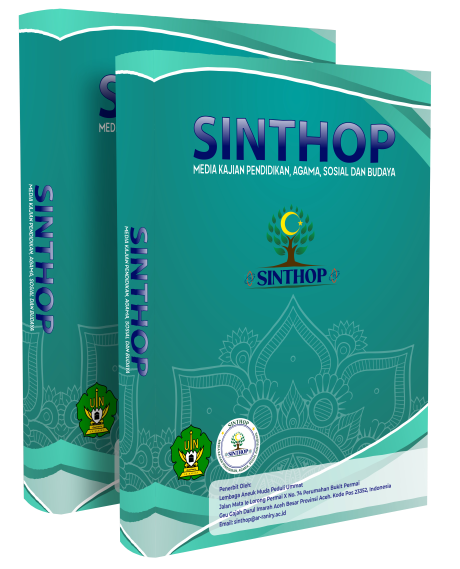Da'wah Methods in Qur'anic Invitations to Reflect on the Universe
DOI:
https://doi.org/10.22373/sinthop.v3i1.5454Keywords:
Al-Qur'an, Da'wah, Universe, SpiritualityAbstract
The Qur'an commands Muslims to observe and interpret the universe rationally, considering natural phenomena as signs of Allah's existence and guidance for humankind. This study explores the Qur'anic method of da'wah through verses inviting reflection on the universe. Employing a qualitative research design and a thematic analysis approach, the study examines Qur'anic verses related to natural phenomena and their implications for da'wah. Primary data sources include ayat kawniyyah (verses about natural phenomena) from the Qur'an, with secondary data from classical and contemporary Islamic scholarship, tafsir literature, and scientific studies on environmental preservation. The analysis reveals that the Qur'an emphasizes the observation and study of the universe, highlighting its creation, balance, and order by Allah. The study identifies three main da'wah methods: da’wah bi al-Hāl (concrete actions in environmental conservation), da’wah bi al-lisan (rational and scientific argumentation), and da’wah bi al-qalb (fostering opposition to environmental destruction). The findings underscore the importance of integrating spiritual, philosophical, and practical dimensions in environmental stewardship.
References
Al-Ahwani, A. F. (1965). Al-Madāris al-Falsafiyah. Al-Maktabah al- Misriyah.
Al-Farmawi, A. H. (1997). Al-Bidayah fi Tafsir al-Maudhu’i. Al-hadharah al- ‘Araby.
Al-Ghazali, I. (2001). Jawahirul Qur’an: Permata Ayat-Ayat Suci. Risalah gusti.
Al-Syathibi, A. I. (1997). Al-Muwafaqat, Jilid I. Dar Al-Ma’rifah.
Jauhari, T. (n.d.). Al-Jawahir fi Tafsir Al-Qur’an. Jilid I.
Mohammad Hatta. (1980). Alam Pikiran Yunani. Tintamas.
Nasr, S. H. (1995). Menjelajah Dunia Modern. Diterjemahkan oleh Hasti Tarekat. Mizan.
Nasution, H. (1973). Falsafat dan Mistisisme dalam Islam. Bulan Bintang.
Qadir, C. . (1989). Filsafat dan Ilmu Pengetahuan Dalam Islam terj. Hasan Basri. Yayasan Obor Indonesia.
Shihab, M. Q. (1997). Membumikan al-Qur’an, Fungsi dan Peran Wahyu dalam Kehdupan Masyarakat. Mizan.
Shihab, Q. (2011). Membumikan Al-Qur’an Jilid 2 (Memfungsikan Wahyu dalam Kehidupan). Lentera Hati.
Syaltut, M. (2009). Tafsir al qur’an al karim (Cet. 13). Dar al-Syaruq.
Zarkasyi, I. B. az. (2006). Al burhan fi ulum al qur’an. Dar al Hadis.
Downloads
Published
How to Cite
Issue
Section
License
Authors who publish in SINTHOP: Media Kajian Agama, Sosial dan Budaya agree to the following terms:
- Authors retain copyright and grant the journal right of first publication with the work simultaneously licensed Attribution-ShareAlike 4.0 International (CC BY-SA 4.0) that allows others to share the work with an acknowledgment of the work's authorship and initial publication in this journal.
- Authors are able to enter into separate, additional contractual arrangements for the non-exclusive distribution of the journal's published version of the work (e.g., post it to an institutional repository or publish it in a book), with an acknowledgment of its initial publication in this journal.
- Authors are permitted and encouraged to post their work online (e.g., in institutional repositories or on their website) prior to and during the submission process, as it can lead to productive exchanges, as well as earlier and greater citation of published work. (See The Effect of Open Acces)









.png)

.png)
.png)
.png)


